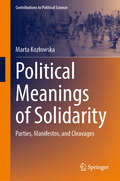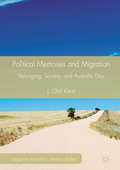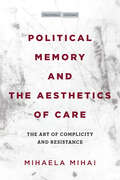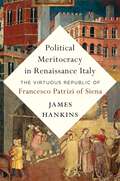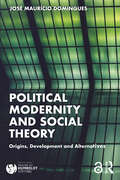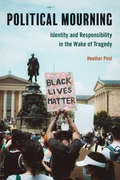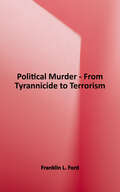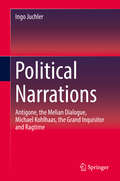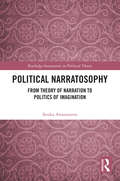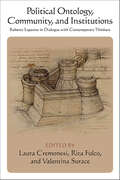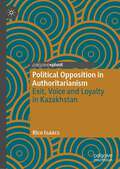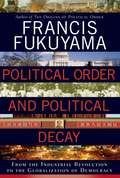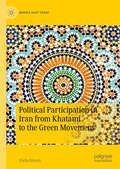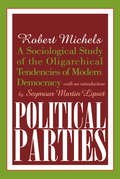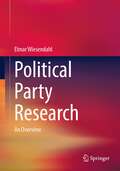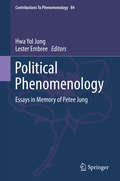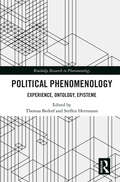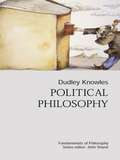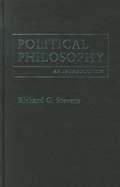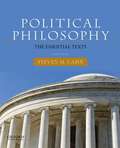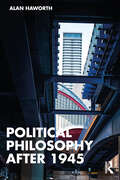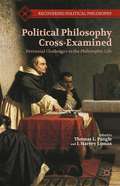- Table View
- List View
Political Meanings of Solidarity: Parties, Manifestos, and Cleavages (Contributions to Political Science)
by Marta KozłowskaThis monograph discusses the concept of solidarity. Using Germany as a case study, the book investigates how political actors – political parties in specific – use the term solidarity in their programmatic documents. It maps out the attitudes, features, and behaviors that the parties continuously denote as expressions of solidarity and reconstructs the generalized concept of solidarity held by each party. It categorizes earlier ideas of solidarity into micro and macro perspectives and uses both theoretical and empirical considerations to build a model of solidarity and identify the elements that make solidarity what it is.Departing from the typical procedure in intellectual history research, this volume takes inspiration from Wittgenstein, starting with the language and tracing it back to its historical setting. Thus, it avoids the trap of speaking of only one meaning of solidarity and allows for more attuned analysis of the differences in understanding the concept. Furthermore, it links the scientific study of the concept of solidarity with research on political competition, and – in broader sense – political theory and party politics research. Closing the gap in scientific coverage of the concept of solidarity, this book will be of interest to students and researchers studying political theory, political sociology, political philosophy, political history, and political parties.
Political Memories and Migration: Belonging, Society, and Australia Day (Palgrave Macmillan Memory Studies)
by J. Olaf KleistThis book explores the relationship between political memories of migration and the politics of migration, following over two hundred years of commemorating Australia Day. References to Europeans’ original migration to the continent have been engaged in social and political conflicts to define who should belong to Australian society, who should gain access, and based on what criteria. These political memories were instrumental in negotiating inherent conflicts in the formation of the Australian Commonwealth from settler colonies to an immigrant society. By the second half of the twentieth century, the Commonwealth employed Australia Day commemorations specifically to incorporate new arrivals, promoting at first citizenship and, later on, multiculturalism. The commemoration has been contested throughout its history based on two distinct forms of political memories providing conflicting modes of civic and communal belonging to Australian politics and policies of migration. Introducing the concept of Political Memories, this book offers a novel understanding of the social and political role of memories, not only in regard to migration.
Political Memory and the Aesthetics of Care: The Art of Complicity and Resistance (Cultural Memory in the Present)
by Mihaela MihaiWith this nuanced and interdisciplinary work, political theorist Mihaela Mihai tackles several interrelated questions: How do societies remember histories of systemic violence? Who is excluded from such histories' cast of characters? And what are the political costs of selective remembering in the present? Building on insights from political theory, social epistemology, and feminist and critical race theory, Mihai argues that a double erasure often structures hegemonic narratives of complex violence: of widespread, heterogeneous complicity and of "impure" resistances, not easily subsumed to exceptionalist heroic models. In dialogue with care ethicists and philosophers of art, she then suggests that such narrative reductionism can be disrupted aesthetically through practices of "mnemonic care," that is, through the hermeneutical labor that critical artists deliver—thematically and formally—within communities' space of meaning. Empirically, the book examines both consecrated and marginalized artists who tackled the memory of Vichy France, communist Romania, and apartheid South Africa. Despite their specificities, these contexts present us with an opportunity to analyze similar mnemonic dynamics and to recognize the political impact of dissenting artistic production. Crossing disciplinary boundaries, the book intervenes in debates over collective responsibility, historical injustice, and the aesthetics of violence within political theory, memory studies, social epistemology, and transitional justice.
Political Meritocracy in Renaissance Italy: The Virtuous Republic of Francesco Patrizi of Siena
by James HankinsThe first full-length study of Francesco Patrizi—the most important political philosopher of the Italian Renaissance before Machiavelli—who sought to reconcile conflicting claims of liberty and equality in the service of good governance.At the heart of the Italian Renaissance was a longing to recapture the wisdom and virtue of Greece and Rome. But how could this be done? A new school of social reformers concluded that the best way to revitalize corrupt institutions was to promote an ambitious new form of political meritocracy aimed at nurturing virtuous citizens and political leaders.The greatest thinker in this tradition of virtue politics was Francesco Patrizi of Siena, a humanist philosopher whose writings were once as famous as Machiavelli’s. Patrizi wrote two major works: On Founding Republics, addressing the enduring question of how to reconcile republican liberty with the principle of merit; and On Kingship and the Education of Kings, which lays out a detailed program of education designed to instill the qualities necessary for political leadership—above all, practical wisdom and sound character.The first full-length study of Patrizi’s life and thought in any language, Political Meritocracy in Renaissance Italy argues that Patrizi is a thinker with profound lessons for our time. A pioneering advocate of universal literacy who believed urban planning could help shape civic values, he concluded that limiting the political power of the wealthy, protecting the poor from debt slavery, and reducing the political independence of the clergy were essential to a functioning society. These ideas were radical in his day. Far more than an exemplar of his time, Patrizi deserves to rank alongside the great political thinkers of the Renaissance: Machiavelli, Thomas More, and Jean Bodin.
Political Modernity and Social Theory: Origins, Development and Alternatives
by Jose Maur¡cio DominguesModern liberal democracy and authoritarian collectivism have known diverse political regimes; autocratic, oligarchic or democratic, they each consist of a mixed, partly oligarchic regime in which plebeian politics are subordinated. With authoritarian collectivism’s defeat, a return to modernity has produced one more hybrid configuration.An in-depth investigation of political modernity and how it is differentiated from other forms of society, this book researches its origins and trajectory as a specific dimension of modern civilisation – articulating a renewed critical theory through an analysis of rights and law, politics, state and autonomy, social reproduction, crisis and political change.Examining these diverse aspects, Political Modernity and Social Theory proposes an encompassing and far-reaching approach spanning past and present – stressing radical plebeian democracy and maintaining a strong opening to the future and to possible alternatives to modernity.The Open Access version of this book, available at www.taylorfrancis.com, has been made available under a Creative Commons Attribution (CC-BY) 4.0 license.
Political Mourning: Identity and Responsibility in the Wake of Tragedy
by Heather PoolWhat leads us to respond politically to the deaths of some citizens and not others? This is one of the critical questions Heather Pool asks in Political Mourning. Born out of her personal experiences with the trauma of 9/11, Pool’s astute book looks at how death becomes political, and how it can mobilize everyday citizens to argue for political change. Pool examines four tragedies in American history—the Triangle Shirtwaist Factory Fire, the lynching of Emmett Till, the September 11 attacks, and the Black Lives Matter movement—that offered opportunities to tilt toward justice and democratic inclusion. Some of these opportunities were taken, some were not. However, these watershed moments show, historically, how political identity and political responsibility intersect and how racial identity shapes who is mourned. Political Mourning helps explain why Americans recognize the names of Trayvon Martin and Sandra Bland; activists took those cases public while many similar victims have been ignored by the news media. Concluding with an afterword on the coronavirus, Pool emphasizes the importance of collective responsibility for justice and why we ought to respond to tragedy in ways that are more politically inclusive.
Political Murder: From Tyrannicide to Terrorism
by Franklin L. FordThe author's unprecedented inquiry into assassination traverses civilizations, cultures, religions, and modes of social behavior to locate the common threads of this often mysterious and always shocking phenomenon. Are there similarities between the killings of the Gracchi brothers and the Kennedy brothers? Does the Baader-Meinhof terrorist gang have roots in the rightist murder teams of Weimar Germany? Was political context as important to the crucifixion of Jesus as to the death of Martin Luther King in 1968? Are political murders usually produced by elaborate conspiracies, or are they more often the work of lone assassins? What circumstances and impulses motivate an individual to risk his or her own life to kill another for reasons of state? This fast-paced narrative, interspersed with reflections, finds intriguing implications in a multitude of famous cases. From the first known case of political murder, Ehud the Benjamite's stabbing of Eglon, to the recent gunning down of Indira Gandhi by two trusted Sikh bodyguards, the frequency of such acts has varied greatly over time. Mainland Greece suffered few political murders in the violent century of Pericles. The Romans, despite their bloody record under the Empire, avoided assassination for almost four hundred years under the Republic. There was a third such "remission" during the twelfth and thirteenth centuries, Europe's high Middle Ages, matched by yet another extending from 1650 to 1789. In the interval between, the sixteenth century was an especially violent time in countries such as Scotland, the Netherlands, and France. Assassination and terrorism increased again after 1815, but the nineteenth century did not come close to equaling the twentieth in the number of brutal episodes. Ford's exploration of calculated, personalized assassination draws on history, literature, law, philosophy, sociology, and religion. Addressing the vast array of cases and combing thousands of years of history, he asks most of all whether assassination works. Does it, in even a minority of cases, produce results consistent with the aims of those who attempt it? Can it forestall evil acts or prevent irreparable damage inflicted by misguided leaders? Or is it "bad politics" in every sense of the term? The questions are numerous, and this book offers a sophisticated basis for seeking answers.
Political Narrations: Antigone, The Melian Dialogue, Michael Kohlhaas, The Grand Inquisitor And Ragtime
by Ingo JuchlerThis book analyzes narrations embedded in political disputes, allowing readers to gain a deeper understanding of modern political reality. The author explores this theme in readings of the Sophocles tragedy Antigone, the Melian Dialogue of Thucydides, Heinrich von Kleist’s novella Michael Kohlhaas, Fyodor Dostoevsky's The Grand Inquisitor and E.L. Doctorow’s Ragtime novel, taking into account the relevant interdisciplinary aspects of the narratives. His study of these four narrations focuses on key political concepts, such as might and right, self-interest, legality and justice, the nation-state and democracy, and relates them compellingly to current actuality. Since narrations can exert comprehensive and lasting influence on individuals’ political discernment, this systematic analysis allows for a better comprehension of politics in education and civics.
Political Narratosophy: From Theory of Narration to Politics of Imagination (Routledge Innovations in Political Theory)
by Senka AnastasovaPolitical Narratosophy offers a critically subversive rethinking of the political and philosophical significance of narrative, and why feminist epistemology and feminist social theory matters for the meaning of the ‘self’ and narrativity. Through a re-examination of the notions of democracy and emancipation, Senka Anastasova coins the term ‘political narratosophy’, a unique interpretation of the philosophy of narrative, identification, and disidentification, developed in conversation with philosophers Jacques Rancière, Nancy Fraser, and Paul Ricoeur. Utilizing the author’s own identity as a feminist philosopher has lived in socialist Yugoslavia, post-Yugoslavia, and Macedonia (now North Macedonia), Anastasova explores the fluctuating and disappearing borders around which identity is situated in a country that no longer exists. She expertly reveals how the subject finds, makes and unmakes itself through narrativity, politics, and imagination. Political Narratosophy is an important intervention in political philosophy and a welcome contribution to the historiography on female authors who lived through twentieth century communism and its aftermath. It will be of great interest to scholars and researchers in the fields of political theory, philosophy, women’s studies, international relations, identity studies, (comparative) literary studies, and aesthetics studies.
Political Obligation: A Critical Introduction (Routledge Contemporary Political Philosophy)
by Dudley KnowlesPolitical obligation is concerned with the clash between the individual’s claim to self-governance and the right of the state to claim obedience. It is a central and ancient problem in political philosophy. In this authoritative introduction, Dudley Knowles frames the problem of obligation in terms of the duties citizens have to the state and each other. Drawing on a wide range of key works in political philosophy, from Thomas Hobbes, John Locke, David Hume and G. W. F. Hegel to John Rawls, A. John Simmons, Joseph Raz and Ronald Dworkin, Political Obligation: A Critical Introduction is an ideal starting point for those coming to the topic for the first time, as well as being an original and distinctive contribution to the literature. Knowles distinguishes the philosophical problem of obligation - which types of argument may successfully ground the legitimacy of the state and the duties of citizens - from the political problem of obligation - whether successful arguments apply to the actual citizens of particular states. Against the anarchist and modern skeptics, Knowles claims that a plurality of arguments promise success when carefully formulated and defended, and discusses in turn ancient and modern theories of social contract and consent, fairness and gratitude, utilitarianism, justice and a Samaritan duty of care for others. Against modern communitarians, he defends a distinctive liberalism: ‘the state proposes, the citizen disposes’.
Political Ontology, Community, and Institutions: Roberto Esposito in Dialogue with Contemporary Thinkers (SUNY series in Contemporary Italian Philosophy)
by Laura Cremonesi Rita Fulco Valentina SuraceFocuses on key aspects of Robert Esposito's thought and explores the ways in which some major contemporary thinkers have been crucial interlocutors in their elaboration.Political Ontology, Community, and Institutions offers a broad view of the current philosophical dialogue in Italy, both in relation to Robert Esposito's own thought and with respect to major issues and authors of crucial philosophical relevance. From his earliest works, Esposito questions the crisis of politics and why thought is unable to convincingly respond to it. He does so by distancing himself not only from political theology but also from those paradigms-destituent and constituent-that have lost nowadays much of their analytical and propositional capacity. However, his proposal is not only critical. Esposito's thought relates to our present through the creation of new categories-among the most recent, those of "instituting thought" and "common immunity"-capable of opening a breach in an apparently increasingly closed horizon. Therefore, dealing with his thought means, first of all, dealing with our present. This is the main goal of this volume, which focuses on Esposito's dialogue with major contemporary thinkers. Also included is an unpublished interview with Esposito conducted by the editors.
Political Opposition in Authoritarianism: Exit, Voice and Loyalty in Kazakhstan (The Theories, Concepts and Practices of Democracy)
by Rico IsaacsHow might political opposition shape regime outcomes over time in an authoritarian system? Most studies on political opposition in authoritarian contexts tend to focus on the agency of the regime over and above that of the political opposition. Using Albert Hirschman’s framework of exit, voice and loyalty, this book examines the case of Kazakhstani opposition agency over 30 years to explore the extent to which political opposition in Kazakhstan has shaped the dynamics of authoritarian regime development in the country. What the analysis reveals is that in Kazakhstan the regime has tended to treat formal institutional political opposition as neither a credible nor non-credible threat. Consequently, the Kazakhstani regime has always responded to opposition exit and voice with sanctions and institutional adaption which strengthened the regime in the short to medium term, but left them exposed to spontaneous, grassroots non-institutional opposition in the longer term. This spontaneous grassroots opposition emerged in Kazakhstan as a series of ‘shocks’ crystalised in the 2011 events in Zhanaozen, the 2016 land protests, the 2019 election protests and the events of ‘qandy qantar’ (bloody January) in 2022. What this book illustrates is how authoritarian regimes which treat opposition threats ambiguously are likely to end up in a continuous state of instability because the feedback provided by opposition agency disappears leaving the regime susceptible to spontaneous opposition.
Political Order and Inequality
by Carles BoixThe fundamental question of political theory, one that precedes all other questions about the nature of political life, is why there is a state at all. Is human cooperation feasible without a political authority enforcing it? Or do we need a state to live together? This problem then opens up two further questions. If a state is necessary to establish order, how does it come into place? And, when it does, what are the consequences for the political status and economic welfare of its citizens? Combining ethnographical material, historical cases, and statistical analysis, this book describes the foundations of stateless societies, why and how states emerge, and the basis of political obligation. As a result of this inquiry, it explains the economic and political roots of inequality, describes the causes of the stagnation of the preindustrial world, and explores what led to the West's prosperity of the past two centuries.
Political Order and Political Decay: From the Industrial Revolution to the Globalization of Democracy
by Francis FukuyamaThe second volume of the bestselling landmark work on the history of the modern stateWriting in The Wall Street Journal, David Gress called Francis Fukuyama's Origins of Political Order "magisterial in its learning and admirably immodest in its ambition." In The New York Times Book Review, Michael Lind described the book as "a major achievement by one of the leading public intellectuals of our time." And in The Washington Post, Gerard DeGrott exclaimed "this is a book that will be remembered. Bring on volume two." Volume two is finally here, completing the most important work of political thought in at least a generation. Taking up the essential question of how societies develop strong, impersonal, and accountable political institutions, Fukuyama follows the story from the French Revolution to the so-called Arab Spring and the deep dysfunctions of contemporary American politics. He examines the effects of corruption on governance, and why some societies have been successful at rooting it out. He explores the different legacies of colonialism in Latin America, Africa, and Asia, and offers a clear-eyed account of why some regions have thrived and developed more quickly than others. And he boldly reckons with the future of democracy in the face of a rising global middle class and entrenched political paralysis in the West. A sweeping, masterful account of the struggle to create a well-functioning modern state, Political Order and Political Decay is destined to be a classic.
Political Participation in Iran from Khatami to the Green Movement (Middle East Today)
by Paola RivettiThis book examines the unintended consequences of top-down reforms in Iran, analysing how the Iranian reformist governments (1997–2005) sought to utilise gradual reforms to control independent activism, and how citizens responded to such a disciplinary action. While the governments successfully ‘set the field’ of permitted political participation, part of the civil society that took shape was unexpectedly independent. Despite being a minority, independent activists were not marginal: without them, in fact, the Green Movement of 2009 would not have taken shape. Building on in-depth empirical analysis, the author explains how autonomous activism forms and survives in a semi-authoritarian country. The book contributes to the debate about the implications of elite-led reforms for social reproduction, offering an innovative interpretation and an original analysis of social movements from a political science perspective.
Political Parties: A Sociological Study of the Oligarchical Tendencies of Modern Democracy
by Robert MichelsThe principle of self-government through political parties, the cornerstone of democracy, has come to be regarded as a solution to the problem of nationality. This is because the principle of nationality entails the acceptance of the idea of popular government. The importance of the principle of nationality is undeniable, and most of the national questions of Western Europe might be solved in accordance with this principle. Matters are complicated by geographical and strategical considerations, such as the difficulty of determining natural frontiers and the frequent need to establish strategic frontiers. Moreover, the principle of nationality cannot help us where nationalities barely exist or where they are entangled in inextricable confusion.The present work is a critical discussion of the problem of democracy. Michels believes that democracy, as an intellectual theory and as a practical movement, has entered upon a critical phase from which exit will be extremely difficult. In this book he analyzes the tendencies that oppose the realization of democracy, and claims that these tendencies can be classified in three ways: dependence upon the nature of the individual; dependence upon the nature of the political structure; and dependence upon the nature of organization.This edition, described by Morris Janowitz as a "classic of modern social science" and by Melvin Tumin as "the beginning of a tradition," offers a landmark study in political science. Following its original publication in 1910, the study and analysis of political parties was established as a new branch of science. Political Parties continues to be a foundation work in the literature and is a necessary addition to the libraries of contemporary political scientists, sociologists, and historians.
Political Party Research: An Overview
by Elmar WiesendahlThe book by the well-known German party researcher Elmar Wiesendahl presents the development, theoretical perspectives, research approaches, and fields of investigation in party research in light of the state of the art.
Political Phenomenology
by Lester Embree Hwa Yol JungThis volume presents political phenomenology as a new specialty in western philosophical and political thought that is post-classical, post-Machiavellian, and post-behavioral. It draws on history and sets the agenda for future explorations of political issues. It discloses crossroads between ethics and politics and explores border-crossing issues. All the essays in this volume challenge existing ideas of politics significantly. As such they open new ways for further explorations BY future generations of phenomenologists and non-phenomenologists alike. Moreover, the comprehensive chronological bibliography is unprecedented and provides not only an excellent picture of what phenomenologists have already done but also a guide for the future.
Political Phenomenology: Experience, Ontology, Episteme (Routledge Research in Phenomenology)
by Thomas Bedorf Steffen HerrmannIn recent years phenomenology has become a resource for reflecting on political questions. While much of this discussion has primarily focused on the ways in which phenomenology can help reformulate central concepts in political theory, the chapters in this volume ask in a methodological and systematic way how phenomenology can connect first-person experience with normative principles in political philosophy. The chapters are divided into three thematic sections. Part I covers the phenomenology of political experience. The chapters in this section focus on a variety of experiences that we come across in political practice. The chapters in Part II address the phenomenology of political ontology by examining the constitution of the realm of the political. Finally, Part III analyzes the phenomenology of political episteme in which our political world is grounded. Political Phenomenology will be of interest to researchers working on phenomenology, Continental philosophy, and political theory.
Political Philosophy
by Dudley KnowlesThis comprehensive introduction to the major thinkers and topics in political philosophy explores the philosophical traditions which continue to inform our political judgements.Dudley Knowles introduces the ideas of key political thinkers including Hobbes, Locke, Marx and Mill and influential contemporary thinkers such as Berlin, Rawls and Nozick. He outlines central problems in political philosophy and encourages the reader to critically engage with all the issues discussed.The individual chapters discuss and analyse:* utilitarianism* liberty* rights* justice* obligation* democracyPolitical Philosophy is ideally suited to students taking introductory courses in political theory and philosophy.
Political Philosophy
by Richard G. StevensThis book by Richard G. Stevens is a comprehensive introduction to the nature of political philosophy. It offers definitions of philosophy and politics, showing the tension between the two and the origin of political philosophy as a means of resolution of that tension. Plato and Aristotle are examined in order to see the search for the best political order. Inquiry is then made into political philosophy's new tension brought about by the growth of revealed religion in the Middle Ages. It then examines the changes introduced by modernity and gives an overview of postmodern political thought. The book covers the most influential philosophers and directs readers to the classics of political philosophy, guiding them in studying them. It is an approachable introduction to a complex subject, not just a history of it. It is a point of entry into the subject for students and for others as well.
Political Philosophy
by Ronald BeinerHannah Arendt's last philosophical work was an intended three-part project entitled The Life of the Mind. Unfortunately, Arendt lived to complete only the first two parts, Thinking and Willing. Of the third, Judging, only the title page, with epigraphs from Cato and Goethe, was found after her death. As the titles suggest, Arendt conceived of her work as roughly parallel to the three Critiques of Immanuel Kant. In fact, while she began work on The Life of the Mind, Arendt lectured on "Kant's Political Philosophy," using the Critique of Judgment as her main text. The present volume brings Arendt's notes for these lectures together with other of her texts on the topic of judging and provides important clues to the likely direction of Arendt's thinking in this area.
Political Philosophy (3rd Edition): The Essential Texts
by Steven M. CahnPolitical Philosophy: The Essential Texts is ideal for survey courses in political philosophy. Offering wide coverage from antiquity to the present, this historically organized collection presents the most significant works from nearly 2,500 years of political philosophy.
Political Philosophy After 1945
by Alan HaworthBy the mid-twentieth century interest in political philosophy had dwindled, with one writer even pronouncing the subject ‘dead’. Things were to change in 1971, when the subject experienced a renaissance with the publication of John Rawls’s A Theory of Justice. The story didn’t end with Rawls however, as other avenues through which to approach the subject became available. In Political Philosophy After 1945 Alan Haworth tells the story of political philosophy from the mid-twentieth century to the early twenty-first. First, he considers why the subject should have become marginalised by mainstream philosophical movements such as logical positivism and the ‘ordinary language philosophy’ inspired by Wittgenstein. Subsequent chapters explain the fundamentals of Rawls’s theory, and then compare and contrast his contribution with that of other philosophers from across the political spectrum. These are followed by chapters in which alternative approaches are examined. There are in-depth accounts of works by Hannah Arendt and Alasdair MacIntyre, as well as an evaluation of the claim that political philosophy exemplifies the pursuit of a moribund ‘Enlightenment project’. Throughout the book, Haworth strikes a balance between historical perspective and close analysis of major texts, and he is careful to emphasise the relevance of theoretical issues to questions which arise beyond theory. As such, Political Philosophy After 1945 is essential reading for students and scholars of political philosophy, but also serves as an introduction for students from across the Humanities and Social Sciences approaching the topic for the first time.
Political Philosophy Cross-examined
by Thomas L. Pangle J. Harvey LomaxPolitical societies frequently regard philosophers as potential threats to morality and religion, and those who speak for politics often demand a defense of philosophy. This book will address philosophy as a mode of existence put into question.
